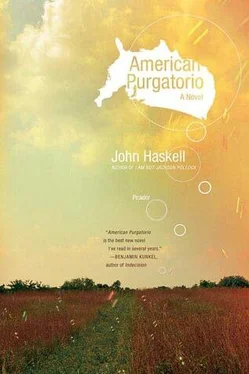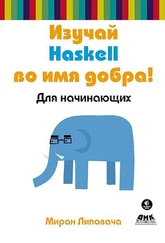John Haskell - American Purgatorio
Здесь есть возможность читать онлайн «John Haskell - American Purgatorio» весь текст электронной книги совершенно бесплатно (целиком полную версию без сокращений). В некоторых случаях можно слушать аудио, скачать через торрент в формате fb2 и присутствует краткое содержание. Год выпуска: 2006, Издательство: Picador, Жанр: Современная проза, на английском языке. Описание произведения, (предисловие) а так же отзывы посетителей доступны на портале библиотеки ЛибКат.
- Название:American Purgatorio
- Автор:
- Издательство:Picador
- Жанр:
- Год:2006
- ISBN:нет данных
- Рейтинг книги:3 / 5. Голосов: 1
-
Избранное:Добавить в избранное
- Отзывы:
-
Ваша оценка:
- 60
- 1
- 2
- 3
- 4
- 5
American Purgatorio: краткое содержание, описание и аннотация
Предлагаем к чтению аннотацию, описание, краткое содержание или предисловие (зависит от того, что написал сам автор книги «American Purgatorio»). Если вы не нашли необходимую информацию о книге — напишите в комментариях, мы постараемся отыскать её.
Los Angeles Times
American Purgatorio — читать онлайн бесплатно полную книгу (весь текст) целиком
Ниже представлен текст книги, разбитый по страницам. Система сохранения места последней прочитанной страницы, позволяет с удобством читать онлайн бесплатно книгу «American Purgatorio», без необходимости каждый раз заново искать на чём Вы остановились. Поставьте закладку, и сможете в любой момент перейти на страницу, на которой закончили чтение.
Интервал:
Закладка:
I try to smile, and for the most part, I think I succeed.
We follow the accepted rules of conversational etiquette — one person talks, then another — and when it’s my turn to talk, although they seem to be listening, what I’m saying doesn’t seem to make much noise. And I don’t really hear them either. I’m watching them, and I can see that they’re moving their lips, but my response to whatever they’re talking about, or the lack of it, doesn’t seem to affect the conversation, or anyone’s understanding of the conversation. Somewhere along the line I see them whispering to each other. They turn to me and I get the idea that they’ve offered me a room for the night. I can feel my head nodding in affirmation, and my voice indicating that Yes, that would be nice. And more than the actual content of our speech, the meaning of the conversation is contained in the fact that by speaking to me they’re acknowledging that at least I’m there.
3
So we all go home together, like a family, like Mom and Dad and Jack. They show me the house, and Geoff says, “Why don’t you get your stuff.” I tell him I don’t have any stuff. And it’s true. I’m wearing everything I own. Moving into the bedroom at the back of the house consists of walking in and sitting on the bed.
Geoff brings me into the master bedroom, their bedroom, and I can picture them lying in the big, newly made bed, loving each other, the laughter in the bed almost audible. To me. Not to Geoff, who opens some drawers in a dresser and brings out some pants and shirts and socks. He holds them out to me and I hold them against my body to check the fit. They’re cleaner than my clothes and I begin wearing them. The pants have a stripe down the sides of the legs. The shirt is white, button-down. The shoes have a spongy insole.
Later, in a pair of borrowed pajamas, I sit on the edge of my bed, looking at the furniture: a dresser, a window, a lamp on a bedside table. The walls are white. A carved wooden bird hangs on a wall. I sit for a long time, forgetting that I’m sitting, and forgetting my breath, which is heavy and bumpy. My heart is beating as if catching up with something. There’s an alarm clock beside the bed with bright green numbers that change into different numbers.
After a while I realize I’ve been sitting on the bed a long time. Like waking up, whatever I’d been doing on the bed before is gone, like an unremembered dream. If I was thinking, I don’t remember what. And if I wasn’t thinking, what was I doing? Whatever it was has faded away, and in waking, I come back to the world, worried that if I let myself go, I’ll be gone entirely.
Days go by, or seem to, one day turning into another, and after a while — no one says anything — I seem to be living with them. Moving around the house, from kitchen to bedroom to bathroom, as we pass each other, I can feel my inconsequentiality. I’m not an obstacle to anything, but neither am I affecting the world in which they move. More and more I take long walks along the beach, or north of the beach, where the rocks start.
On certain nights Linda goes away to a class, and on one of those nights I find myself sitting on the sofa looking through an album of photographs, of Geoff and Linda on various vacations, and one of the photographs, with a lagoon in the background, freezes me. The two of them are standing in a jungle, looking at the camera, and you can actually see the happiness playing on their faces. I tell Geoff, who’s reading a magazine, that it’s a beautiful picture, thinking the expression of happiness, which lingers with me even when I look away, is something beautiful. I realize they’ve known each other for years, that their bond is strong. “Could I have a copy of this?” I ask him.
As I stare down at their faces full of happiness, full of transient joy, I see in the photograph, not only the happiness, but also the end of that happiness. As I continue staring at the fleeting moment revealed in the shiny piece of paper I can see the fleeting quality of everything, of life and the memory of life, and when I look up at Geoff, sitting in a chair in a room, it’s like looking at a photograph. Man with Crossed Legs. The room and Geoff and even my act of looking are part of a fleeting moment which is over before it begins. I close the book of photos. “Never mind,” I say. “But thanks.”
A few days later, or hours later — I’ve lost track — I’m sitting on the same sofa. Geoff has gone to work so it must be during the day. Linda is stretching her legs on a mat near the wall in the living room. Light is coming in through the front windows and I sit, listening to her breathing, watching her on the blue mat in an exercise outfit, which, I imagine, wicks moisture away from her body.
I’m also looking at the rug on the floor and the shelves with boxes of music on the wall, and I’m pretty sure I’m sitting in a chair in a house in a city watching a person saluting an imaginary sun, moving her body into a variety of shapes. But because I’m not completely sure, and want some surety, I say something to Linda about something, it doesn’t matter what because what I want is her attention. I want her to corroborate the world that seems to be the one I’m in. Because she’s concentrating on something else, something other than the world we share, I stand up and walk to the closet. I find a vacuum cleaner and snap on a carpet attachment. I plug the cord into the wall and begin vacuuming the rug in the room where she’s practicing.
I want to be in her thoughts, to exist in those thoughts, and so, although the rug is not that big, I keep vacuuming. She says something about not being able to concentrate, but I continue vacuuming. At which point she stands up and I think she has the intention of telling me to stop. But then she changes her mind. Some people are blessed with sympathy, and so she goes into the kitchen, finds a bucket of rags, grabs a handful, moistens them in the white sink and then hands me a rag and begins dusting. The windowsills and along the stereo shelves. I get on my hands and knees, and there’s nothing like activity to distract the mind, and thank god for distraction I think as I start scrubbing the floor and the baseboards, trying to get every last bit of dust and sand and hair. We’re both doing it, working together, and the room is not boundless so we finish and move to the bedroom. There’s a lot of dust there. I take the vacuum and she wipes down the woodwork. We make the bed, put away the dirty clothes, and we finish that room. Then the bathroom. The toilet needs scrubbing and the floor needs mopping and that’s what we do. She polishes the mirror and the sink and I’m standing in the tub, using cleanser and sponge, cleaning the tiles and the area between the tiles, scrubbing off the mildew stuck to the porous grout. We work in a kind of unison, and it’s hard to tell who’s cleaning what, our various hands becoming a single pair of hands, scrubbing and rinsing and squeezing the sponge.
And then she steps into the tub. She kneels down and begins scrubbing the same tiles I’ve just polished, and I tell her, “I’ve already cleaned those tiles,” but she keeps working, scraping away the discoloration. And that’s when I realize that I haven’t cleaned anything. I thought I was cleaning, and wanted to be cleaning, but I was just standing there the whole time, slightly off to the side, watching her. I thought I was holding a sponge, but when I look at my hand nothing’s there. I thought I was making some progress. I thought I was feeling connected to the world but instead of connected, I’m dis connected. And in the middle of that disconnection I seem hardly to exist.
I step out of the tub and follow Linda back to the kitchen. She puts the cleaning supplies under the sink. She goes to her rubber mat and begins where she left off with her yoga. She kneels down and then she stands on her head.
Читать дальшеИнтервал:
Закладка:
Похожие книги на «American Purgatorio»
Представляем Вашему вниманию похожие книги на «American Purgatorio» списком для выбора. Мы отобрали схожую по названию и смыслу литературу в надежде предоставить читателям больше вариантов отыскать новые, интересные, ещё непрочитанные произведения.
Обсуждение, отзывы о книге «American Purgatorio» и просто собственные мнения читателей. Оставьте ваши комментарии, напишите, что Вы думаете о произведении, его смысле или главных героях. Укажите что конкретно понравилось, а что нет, и почему Вы так считаете.











